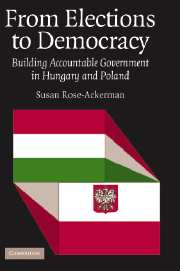Book contents
- Frontmatter
- Contents
- List of Tables
- Preface
- 1 Policy-Making Accountability and Democratic Consolidation
- 2 Alternative Routes to Policy-Making Accountability
- 3 Legacy of the Past
- 4 External Accountability and the European Union
- 5 Oversight
- 6 Decentralized Political Accountability
- 7 Public Participation in Policy Making: Government Procedures
- 8 Civil Society Groups: Overview
- 9 Environmental Advocacy Organizations in Hungary
- 10 Student and Youth Organizations in Poland
- 11 Democratic Consolidation and Policy-Making Accountability
- Appendix 1
- Appendix 2
- References
- Index
1 - Policy-Making Accountability and Democratic Consolidation
Published online by Cambridge University Press: 23 July 2009
- Frontmatter
- Contents
- List of Tables
- Preface
- 1 Policy-Making Accountability and Democratic Consolidation
- 2 Alternative Routes to Policy-Making Accountability
- 3 Legacy of the Past
- 4 External Accountability and the European Union
- 5 Oversight
- 6 Decentralized Political Accountability
- 7 Public Participation in Policy Making: Government Procedures
- 8 Civil Society Groups: Overview
- 9 Environmental Advocacy Organizations in Hungary
- 10 Student and Youth Organizations in Poland
- 11 Democratic Consolidation and Policy-Making Accountability
- Appendix 1
- Appendix 2
- References
- Index
Summary
The dawn of the twenty-first century has seen a tremendous increase in the number of “democracies,” but only under a minimalist understanding of the term. On one account, democracy requires only a stable, competitive electoral system with broad suffrage, institutionalized political parties, and alternations in power. I challenge this definition and argue that full democracy cannot be attained unless the policy-making process is accountable to citizens through transparent procedures that seek to incorporate public input. In a democracy, individuals and institutions must justify the exercise of power over others, and success in an election is, I argue, insufficient to make this claim.
I illustrate my argument through the study of two postsocialist countries, Hungary and Poland, that have made the transition to electoral democracy but have relatively weak policy-making accountability. The efforts at state building that followed the end of the socialist regimes in Eastern Europe focused on the establishment of free elections and on assertions of individual rights against state overreaching. Many of these states, including Hungary and Poland, have made impressive progress in effecting dramatic changes in their governments, economies, and societies. They have gone a long way toward “rebuilding the ship at sea,” as Jon Elster, Claus Offe, and Ulrich Preuss (1998) demonstrate in their study of the first years of the transition. But the task is not complete even among the frontrunners.
During the first decade of the transition, little emphasis was given to broader issues of popular control and government accountability outside the electoral process.
- Type
- Chapter
- Information
- From Elections to DemocracyBuilding Accountable Government in Hungary and Poland, pp. 1 - 13Publisher: Cambridge University PressPrint publication year: 2005



